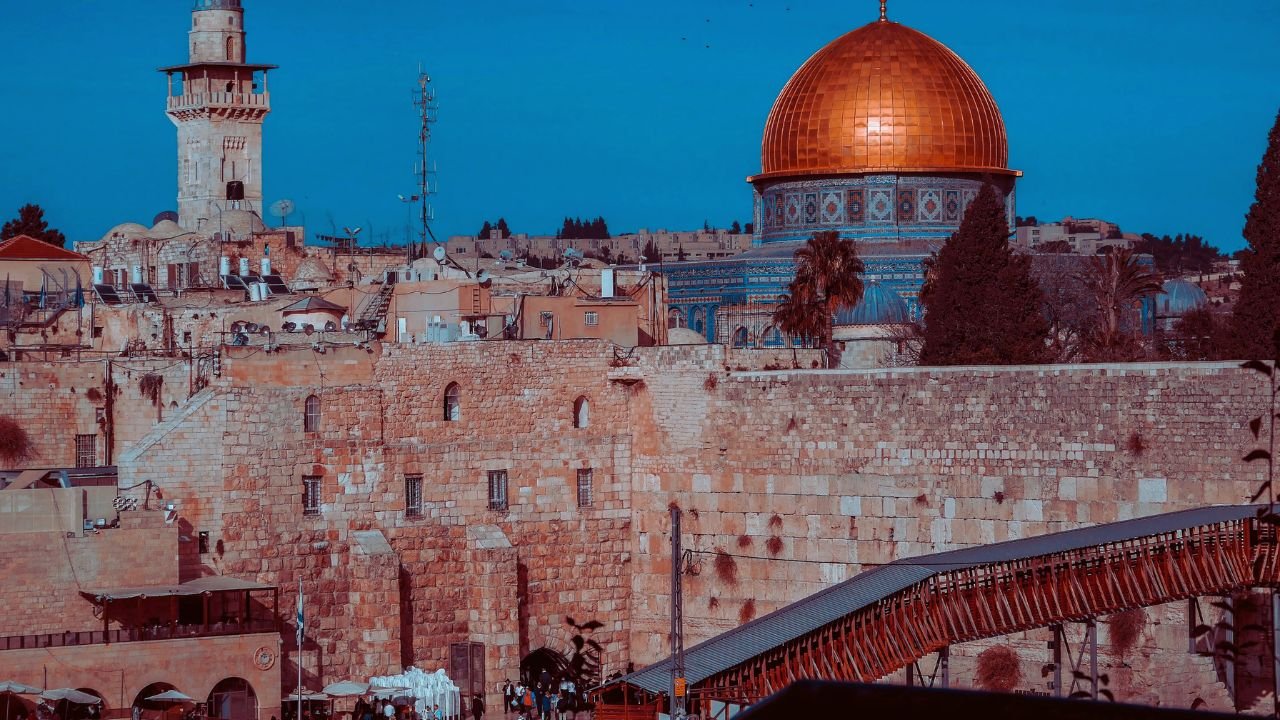The Iran-Israel conflict is a deeply entrenched issue that has spanned decades. It involves political, military, and religious tensions between the two nations, impacting not only the Middle East but the broader international community. With the geopolitical landscape constantly shifting, staying updated on the latest developments surrounding the Iran-Israel war is crucial for understanding the global implications.The Iran-Israel conflict is not a recent phenomenon but rather a complex issue that has spanned several decades. Its origins can be traced back to the political, ideological, and religious differences that have defined the Middle East. The conflict intensified after the Iranian Revolution of 1979, which saw the overthrow of the Shah of Iran and the rise of the Islamic Republic under Ayatollah Khomeini.
This shift in power marked the beginning of a deep animosity between Iran and Israel as the new Iranian regime rejected Israel’s right to exist and has since supported various militant groups that oppose Israel, such as Hezbollah in Lebanon and Hamas in the Gaza Strip. Meanwhile, Israel views Iran as a direct threat to its security, especially with Iran’s nuclear ambitions and its influence in the region. These longstanding tensions, underpinned by political rivalries, religious ideologies, and security concerns, have shaped the course of events and escalated the conflict into what we see today.
The Historical Context of the Iran-Israel Conflict
The Iran-Israel conflict is rooted in deep historical, political, and ideological differences. The foundation of the current tensions can be traced back to the early years of the Israeli state, the Iranian Revolution of 1979, and the subsequent rise of the Islamic Republic of Iran. Over time, these differences have become more pronounced, marked by political rivalries, military confrontations, and diplomatic standoffs.
Iran’s Role in the Middle East
Since the Iranian Revolution of 1979, Iran has sought to solidify its position as a dominant regional power in the Middle East. This ambition is driven by the goal of spreading its Shia Islamic ideology and countering Western influence in the region. Iran has achieved this by providing financial, military, and logistical support to various militant groups and governments that share its interests, such as Hezbollah in Lebanon, Shiite militias in Iraq, and the Houthis in Yemen. These alliances have made Iran a significant player in regional conflicts, particularly in countries like Syria and Iraq, where it has helped to influence political outcomes and support governments aligned with its interests. Iran’s growing influence and its support for groups hostile to Israel have contributed to ongoing tensions with Israel, which views Iran as a major threat to regional stability and its own security.
Israel’s Position and Security Concerns
Israel, established in 1948, has long viewed Iran’s regional ambitions, particularly its nuclear program, as a direct existential threat. Israel’s concerns are rooted in Iran’s rhetoric, which often calls for the destruction of the Israeli state and its continued military advancements. The Israeli government has expressed alarm over Iran’s nuclear program, fearing that Iran could eventually develop nuclear weapons, which would dramatically shift the balance of power in the region. In response, Israel has adopted a proactive security strategy, including covert operations and direct military actions, aimed at curbing Iran’s influence and preventing its nuclear ambitions from materializing. Israel has also targeted Iranian-backed groups operating in Syria and Lebanon, viewing these groups as an extension of Iran’s influence in its backyard. With both nations deeply entrenched in their positions, the situation remains a significant source of instability in the Middle East.
The Latest Updates on the Iran-Israel Conflict
The Iran-Israel conflict continues to evolve, with each side leveraging its strengths in a bid for regional dominance. As tensions rise, the world watches closely to understand how the situation will unfold. Below is an overview of the current events and developments in the ongoing Iran-Israel war.
| Date | Event/Development | Impact |
| Jan 2025 | Israeli airstrikes on Iranian military sites | Heightened tensions and retaliations |
| Jan 2025 | Iran’s missile test over Israel’s borders | Increased fear of escalation in the region |
| Jan 2025 | Diplomatic talks break down | A setback for peace efforts |
| Jan 2025 | Hezbollah supports Iran’s military actions | Further complicates the regional dynamic |
The table above highlights key events that have been shaping the current phase of the conflict. These developments are not isolated but are part of a broader, ongoing geopolitical struggle that involves various players, including the U.S., Russia, and European nations.
The Military Struggle: Airstrikes and Ground Operations
The military aspect of the Iran-Israel conflict is characterized by a mix of airstrikes, cyberattacks, and covert operations. Both sides have engaged in direct military actions, including Israeli airstrikes on Iranian military positions and Iranian-backed forces in Syria, Iraq, and Lebanon. The conflict also extends into the cyber domain, with both nations engaging in cyber warfare.
Israel, with its advanced military capabilities, has frequently carried out airstrikes aimed at neutralizing Iranian targets. Iran, on the other hand, has made significant advancements in missile technology and has demonstrated its ability to strike back. These military actions contribute to a cycle of retaliation that makes the conflict increasingly volatile.
Hezbollah’s Involvement in the Iran-Israel War
Hezbollah’s involvement in the Iran-Israel conflict has become increasingly significant in recent months. The Lebanese militant group, which receives financial, military, and ideological support from Iran, has been actively supporting Iran’s military actions against Israel. Hezbollah’s role in the conflict goes beyond merely providing logistical support; it has also launched attacks on Israeli territory, especially along Israel’s northern border. As one of the most powerful non-state actors in the region, Hezbollah adds another dimension to the conflict, creating a multi-front battle for Israel.
For Israel, Hezbollah represents a significant threat due to its military capabilities and proximity to Israeli borders. The group’s deep ties to Iran further complicate the situation. making it a proxy for Iranian influence in the region and intensifying the regional rivalry between Israel and Iran.
Diplomatic Efforts and International Reactions
Despite the ongoing military conflict, diplomatic efforts to resolve the Iran-Israel tensions remain a critical aspect of international efforts. International organizations, particularly the United Nations, and countries like the United States, Russia, and China have continually sought to mediate peace talks and reduce hostilities. However, these diplomatic initiatives often face considerable challenges due to the entrenched positions of both Iran and Israel. Israel’s security concerns, especially regarding Iran’s nuclear program and support for militant groups, complicate any potential peace process.
On the other hand, Iran’s political and ideological commitment to challenging Israel’s existence makes negotiations difficult. While international powers continue to pressure both sides for de-escalation, their involvement remains limited, as both Iran and Israel are highly unlikely to compromise on their core objectives, making a lasting resolution elusive.
The Role of the United States and the International Community
The U.S. has historically been an ally of Israel, and it has frequently intervened in the conflict, either through direct military support or diplomatic efforts. On the other hand, Iran enjoys support from countries like Russia and China, which complicates the situation further. The international community remains divided on how to address the Iran-Israel conflict, with some calling for sanctions on Iran and others advocating for diplomatic solutions.
The Future of the Iran-Israel Conflict
The future of the Iran-Israel conflict remains uncertain, as the evolving geopolitical landscape plays a pivotal role in shaping its trajectory. Key factors influencing the conflict include the political leadership in both Iran and Israel, with each country’s leadership determined to assert its respective ideological stance. Additionally, the influence of international actors, such as the United States, Russia, and European powers, will continue to shape diplomatic efforts and military engagement.
With regional powers like Saudi Arabia and Turkey also playing significant roles, shifting alliances and rivalries could lead to new dynamics in the ongoing tensions. While both nations remain deeply entrenched in their positions, the potential for diplomatic breakthroughs or military escalations remains high, making the outcome of the conflict unpredictable.
The Role of Nuclear Weapons in the Conflict
A central element of the Iran-Israel conflict is Iran’s nuclear program. Israel perceives Iran’s nuclear ambitions as an existential threat, fearing that Iran’s potential development of nuclear weapons could destabilize the region and lead to direct confrontation. Israel has repeatedly stated that it will not allow Iran to acquire nuclear capabilities and has taken military action to target Iranian nuclear facilities. On the other hand, Iran insists that its nuclear program is for peaceful purposes, asserting its right to develop nuclear technology under international law.
However, the continued advancement of Iran’s nuclear capabilities raises concerns about regional security and the possibility of a new arms race in the Middle East. If Iran succeeds in acquiring nuclear weapons, it could dramatically shift the power balance, prompting other countries in the region to seek similar capabilities and leading to further instability.
Wrapping up
The Iran-Israel conflict remains one of the most complex and volatile geopolitical issues in the world today. With ongoing military operations, diplomatic breakdowns, and international involvement, the situation continues to evolve. As tensions rise, the world watches closely, hoping for a resolution but preparing for further escalation. Understanding the latest updates and coverage of this conflict is crucial for anyone interested in the dynamics of the Middle East and the broader global security environment.As the Iran-Israel conflict continues to unfold, the future remains uncertain. Both nations have entrenched positions, and despite numerous international efforts to mediate peace, a resolution seems far from reach. Israel’s security concerns, particularly surrounding Iran’s nuclear capabilities and its support for hostile militant groups, remain paramount.
On the other hand, Iran’s ambition to assert itself as a regional power often brings it into direct opposition with Israel, leading to military confrontations and diplomatic standoffs. The ongoing conflict not only affects the two nations involved but also has profound implications for the broader Middle East and the world. Global powers like the United States, Russia, and China are closely monitoring the situation, as their involvement could either escalate or help de-escalate the tensions. For now, the conflict remains a high-stakes geopolitical challenge with no clear end in sight, and the world continues to watch with bated breath.
FAQs
What sparked the Iran-Israel conflict?
The Iran-Israel conflict dates back to the 1979 Iranian Revolution, which saw the overthrow of the Shah and the establishment of an Islamic republic under Ayatollah Khomeini. The new Iranian government was opposed to Israel’s existence, and tensions worsened after Iran’s support for militant groups targeting Israel. These ideological and political differences have since fueled a cycle of conflict, both directly and indirectly, through proxy wars in the region.
What is the impact of the Iran-Israel conflict on the Middle East?
The Iran-Israel conflict has had a profound impact on the Middle East, contributing to widespread instability. It has led to ongoing military confrontations, with both sides engaging in airstrikes, cyberattacks, and ground operations. The involvement of proxy groups and nations has further complicated the situation. Additionally, the war has caused ripple effects, sparking other regional conflicts and heightening the risk of broader regional wars involving countries like Syria, Lebanon, and Iraq.
What is Israel’s main concern in the Iran-Israel war?
Iran’s nuclear program is Israel’s biggest worry because it sees it as an existential danger. If Iran were to develop nuclear weapons, Israel fears it would face an imminent security threat that could alter the balance of power in the region. Israel has repeatedly expressed its opposition to Iran’s nuclear ambitions, taking preemptive actions, including airstrikes on Iranian nuclear facilities and military infrastructure in Syria, to prevent Iran from advancing its capabilities.
How has Hezbollah influenced the conflict?
Hezbollah, a Lebanese militant group backed by Iran, has significantly influenced the Iran-Israel conflict by supporting Iranian military operations against Israel. Hezbollah has become a key player in the region, frequently launching rocket attacks and engaging in skirmishes with Israel from Lebanon. The group’s involvement complicates the conflict, as it adds another front for Israel to contend with. Hezbollah’s presence in the war serves as a strategic extension of Iran’s influence in the region, heightening the risk of broader escalation.
What role do international powers play in the Iran-Israel conflict?
International powers, including the United States, Russia, and European nations, have played a significant role in influencing the outcome of the Iran-Israel conflict. The U.S. has historically been an ally of Israel, providing military support and sanctions against Iran. Russia and China have tended to support Iran, particularly in diplomatic matters, which adds to the complexity of international relations surrounding the conflict. These powers often engage in peace talks, impose sanctions, or use their influence to shape regional policy in response to the ongoing war.
What are the potential consequences of Iran acquiring nuclear weapons for Israel?
If Iran were to acquire nuclear weapons, it would drastically change the balance of power in the Middle East. Israel views a nuclear-armed Iran as an existential threat, as it could potentially use nuclear weapons against Israel or its allies. The prospect of an Iranian nuclear arsenal could spark an arms race in the region, with other countries, including Saudi Arabia and Turkey, seeking to develop their own nuclear capabilities. This escalation could lead to a highly unstable security environment in the Middle East.
How might the Iran-Israel conflict affect global oil markets?
The Iran-Israel conflict has the potential to disrupt global oil markets due to the strategic importance of the Middle East in global energy supply. As both countries are located in a region that is home to some of the world’s largest oil reserves, any military escalation could lead to oil price volatility. Tensions over the Strait of Hormuz, a vital shipping lane for oil exports, could also lead to shipping disruptions, further driving up oil prices and affecting global markets. The ripple effects of such a conflict could have significant economic consequences worldwide.










